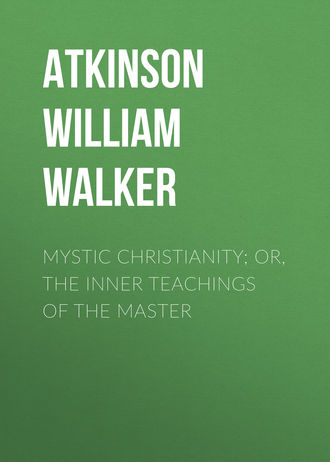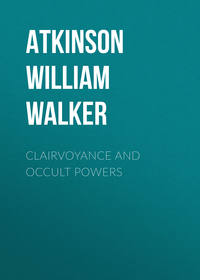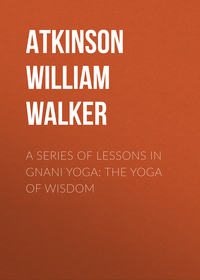 полная версия
полная версияMystic Christianity; Or, The Inner Teachings of the Master
The succeeding months were filled with wanderings up and down the land, spreading the work and making new converts and followers. Jesus did not take the position of a great preacher at this time, but seemed to be rather a teacher of the few whom He gathered around Him at each point and place. He observed but few ceremonies, that of Baptism being the principal one, and which, as we have shown, was an Essenic rite having an occult and mystical significance. The students of the New Testament may read between its leaves the history of the ministry of Jesus at this time, noting the working of the leaven in the mass of the Jewish mind.
About this time Jesus was sorely distressed at the terrible news which reached Him regarding the fate of his cousin, John the Baptist, who had been His Forerunner. The Baptist had dared to thrust his preachings and rebukes into the very precincts of a corrupt court, and had brought down upon his head the natural consequences of his rashness. Herod had thrust him into a gloomy dungeon and there were rumors of a worse fate yet in store for him. And that fate soon overtook him. Refusing the chance of life and liberty that was promised him if he would but break his vows of asceticism and indulge the passionate desires of a royal princess,—turning away from the base proposal with the horror of the true mystic,—he met his fate like a man knowing the Truth, and the head which graced the royal platter bore upon its face no expression of fear or regret. John had conquered even in Death.
Jesus retired once more into the Desert upon the news of John's death reaching him. Added to His sorrow came the conviction that there was a new work set before Him to do. John's death necessitated a combining of the work of the Baptist with that of Jesus' own ministry. The followers of the two teachers must be combined into one great body, under the supervision of the Master Himself, aided by the most worthy and capable of His disciples. The tragic death of John played a most important part in the future ministry of the Master, and He sought the solace and inspiration of the Desert in His consideration of the plans and details of His new work. Students will note that from the time He emerged from the Desert He threw off the cloak of reserve and retirement and stepped boldly before the people as an ardent preacher to multitudes and an impassioned orator and public speaker. No more the little circle of appreciative students—the rostrum with the great crowds of hearers were His from that time.
Returning from His work in Samaria and Judea, He once more made Galilee the scene of His principal work. The new spirit which He now threw into His preaching attracted the attention of the public, and enormous crowds attended His meetings. He spoke now with a new air of authority, differing greatly from His former mild tones as a teacher of the few. Parables and allegories and other rich Oriental figures of speech fell from His lips, and many of the educated classes flocked to hear the wonderful young orator and preacher. He seemed to have an intuitive insight into the minds of His hearers, and His appeals reached their hearts as personal calls to righteousness, right thinking and right living. From this time on His ministry assumed the character of an active propaganda, instead of the usual quiet mission of the Mystic.
And here began that remarkable series of wonder workings or "miracles" which He evidently employed to attract the attention of the public and at the same time to perform kindly and worthy acts. Not that He used these wonder-workings as a bid for sensational interest or self-glory—the character of Jesus rendered such a course impossible—but He knew that nothing would so attract the interest of an Oriental race as occurrences of this kind, and He hoped to then awaken in them a real spiritual interest and fervor, which would rise far above the demand for "miracles." In adopting this course Jesus followed the example of the holy men in India, with whose works He was personally familiar, owing to His sojourn in that land.
And, then let us say, that advanced occultists see nothing "supernatural" nor incredible in these "miracles" of Jesus. On the contrary, they know them to be the result of the application of certain well established natural laws, which, while almost unknown to the masses of people, are still known and occasionally made use of by the advanced occultists of all lands. Skeptics and unbelievers may sneer at these things, and many faint-faith Christians may wish to apologize or "explain" these wonderful happenings, but the advanced occultist needs no "explanations" nor apologies. He has more faith than the church-goer, for he knows of the existence and use of these occult powers latent in Man. There is no material effect or phenomenon that is "supernatural"—the Laws of Nature are in full operation on the material plane and cannot be overcome. But there are among such Natural Laws certain phases and principles that are so little known to the average mind that when they are manifested Nature's Laws seemed to be transcended, and the result is called "a miracle." The occult tradition tells us that Jesus was a past-master in the knowledge and application of the occult forces of nature, and that even the wonders that He wrought during His Jewish ministry were but as child's play when compared with those that He might have manifested had He seen fit to do so. In fact, it is believed that some of His greatest wonder-workings have never been recorded, for He always impressed upon His chosen followers the advisability of refraining from laying too much stress on these things. The "miracles" recorded in the Gospels were only those which were most widely known among the people. The greater-wonders were deemed too sacred for common gossip.
When the Master and His followers reached Cana, which, by the way, had been the scene of his first "miracle"—the changing of the water into wine at the wedding feast—one of the most striking of His earlier manifestations of occult power occurred. An influential citizen of Capernaum, a town a score of miles distant, who met Him and besought His aid and power in the interest of his young son, who lay dying at his home. The man besought Jesus to hasten to Capernaum to heal the youth ere he die. Jesus smiled kindly upon him and bade him return to his son, for the youth was even now restored to health and strength and life. His hearers were astounded at the reply and the doubters smiled knowingly, foreseeing a defeat for the young Master when the news of the youth's death should become known. Those of His followers who were faint of heart and weak of faith felt most uncomfortable and began to whisper the "if" of doubt. But Jesus continued His working with a calm air of certainty, without further remarks. It was the seventh hour of the day when the words were spoken.
The father hastened homeward to see whether the Master had succeeded or failed. A day or two passed with no word from Capernaum. The scoffers of the wedding feast repeated their sneers and revilings—the word "charlatan" was again heard passing from lip to lip. Then came news from the distant village, and upon its arrival the voice of scorn was stilled, and the hearts of the faint again beat freely. The word came that when the father had reached his house he was greeted by the household with cries of joy and news that at the seventh hour the fever had abated and the crisis had been passed.
And yet the "miracle" above recorded was no greater than many occultists have performed in all times—no greater than the many similar cures that have been performed by the modern healers of the many metaphysical cults. It was simply an application of the subtle forces of nature called into operation by mental concentration. It was an instance of what in modern phrase is called "absent treatment" along metaphysical lines. In saying this we wish in no way to detract from the wonder that Jesus had wrought, but merely to let the student know that the power is still possessed by others and is not a "supernatural" thing but the operation of purely natural laws.
About this time there occurred another event in His life, and a manifestation of His power which is noted in the New Testament and which is told in the occult tradition with somewhat more detail. It occurred when Jesus visited his home town of Nazareth on the eve of the Jewish Sabbath. He rested over night and then the following morning betook Himself to the regular services in the local synagogue. He took the seat which He had occupied as a young boy with Joseph. No doubt the familiar scene awakened memories of His strange youthful history in His mind. Then, much to His surprise, He heard Himself called to the platform to conduct the service. It must be remembered that Jesus was a regular rabbi, or priest, by birth, education and training, and was entitled to Conduct the Jewish service. No doubt His townspeople wished to hear their young townsman address and exhort them. He took the place of authority in the synagogue and proceeded to read the regular service in the accustomed manner, as prescribed by the custom and laws of the church. The prayers, chantings and readings succeeded each other in their regular order. Then came the preaching of the sermon. Taking the sacred roll from its receptacle, He read the text from Isaiah, "The spirit of the Lord is upon me because He hath anointed me to preach the good tidings," etc. Then He began his exposition of the text He had just read.
But instead of the expected customary words and illustrations—technical theological hair-splitting and dreary platitudes—He began to preach in a manner unknown to the Nazarenes. His opening sentence broke the silence and greatly startled and disturbed the congregation. "This day is this Scripture fulfilled in your ears," were his opening words. And then He began a statement of His conception of His ministry and His Message. Thrusting aside all precedent and musty authority, He boldly proclaimed that He had come to establish a new conception of the Truth—a conception that would overturn the priestly policy of formalism and lack of spirituality—a conception that would ignore forms and ceremonies, and cleave close to the spirit of the Sacred Teachings. And then He began a scathing denunciation of the lack of spiritual advancement among the Jewish people—their materialism and desire for physical enjoyments and their drifting away from the highest ideals of the race. He preached the mystic doctrine, and insisted that they be applied to the problems of every-day life and conduct. He brought down the teachings of the Kaballah from the cloudy heights, and set them before the people in plain, practical form. He bade them aspire to great spiritual heights, forsaking the base ideals to which they had clung. He ran counter to every custom and prejudice of the people before Him, and showed a lack of reverence for all of their petty forms and traditions. He bade them leave the illusions of material life and follow the Light of the Spirit wherever it might lead them. These and many other things told He them.
And then arose a disturbance among the congregation. They began to interrupt and question Him, and many were the contradictions and denials hurled at Him from the benches. Some began to sneer at His pretensions as the Bearer of the Message, and demanded that He work a wonder or "miracle" and give them a sign. This demand He flatly refused to grant, not deeming the same proper, or in accordance with the occult custom which always frowned upon wonder-working in response to such a demand. Then they began to abuse Him and cries of "charlatan" and "fraud" began to resound from the walls of the synagogue. They reminded Him of His humble birth and condition of His parents, and refused to believe that any such person as He had any right to claim extraordinary powers or privileges. Then came from His lips the famous saying, "A prophet is not without honor, save in his own country."
Then He began a fresh assault upon their prejudices and narrow views—their pet superstitions and bigotry. He stripped from them their garb of hypocrisy and assumed piety, and showed them their naked souls in all their ugliness and moral uncleanliness. He poured burning invective and vitriolic denunciations into their midst, and spared no terms that could properly be applied to them. In a short time the congregation was beside itself with rage, and the pretended righteous indignation of a flock of hypocrites and formalists who had heard themselves described in disrespectful terms by one they regarded as an upstart young man from the lower classes of their virtuous community. They felt that they had bestowed a flattering honor upon Him, as a mark of consideration for a young townsman upon His return from a foreign and domestic missionary tour. And now to think that He had thus basely betrayed their courtesy and showed in how little esteem He really held them—surely this was beyond human endurance. And then the storm broke upon Him.
Leaving their seats in the synagogue, the congregation rushed upon the young preacher, and tearing Him from the platform, they pushed Him out of the building. And then the jostling, hustling, pushing crowd carried Him before them along the village streets and out into the suburbs. He resisted not, deeming it unworthy to struggle with them. At last, however, He was compelled to defend Himself. He perceived that it was the intention of the mob to push Him over a precipice that had been formed on the side of a hill just beyond the town limits. He waited patiently until they had urged Him to the very brink of the decline, and until it needed but one strong push to press Him over its edge and into the gorge below. And then He exerted His occult forces in a proper self-defense. Not a blow struck He—not a man did He smite with the wondrous occult power at His command, which would have paralyzed their muscles or even have stretched them lifeless at His feet. No, he controlled Himself with a firm hand, and merely bent upon them a look. But such a look!
A glance in which was concentrated the mighty Will developed by mystic knowledge and occult practice. It was the Gaze of the Occult Master, the power of which ordinary men may not withstand. And the mob, feeling its mighty force, experienced the sensation of abject fear and terror. Their hair arose, their eyes started from their sockets, their knees shook under them, and then, with a wild shout of horror they began to scatter and fly, making a wide pathway for the Man of Mystery who now strode through their ranks with that awful gaze which seemed to pierce the veil of mortality and to peer at things ineffable and beyond human ken. And with His eyes refusing to look again upon the familiar scenes of His youth, He departed from Nazareth, forsaking it forever as His home place. Verily, indeed, the Prophet hath no honor in His own land. Those who should have been His staunchest supporters were the first in His own land to threaten Him with violence. The attempt of Nazareth was the prophecy of Calvary, and Jesus so knew it. But He had set his feet upon The Path, and drew not back from it.
Turning His back upon Nazareth, Jesus established a new centre or home in Capernaum, which place remained the nearest approach to home to Him during the remainder of His Ministry and until His death. The traditions have it that His mother came to live also at Capernaum, together with some of His brothers. It is also related that his sisters and brothers, both those remaining at Nazareth and those removing to Capernaum, were sorely vexed with Him at His conduct at the synagogue, which they deemed not "respectable" nor proper, and they accordingly looked upon Him as an eccentric relative whose vagaries had brought disrepute upon the family. He was regarded much in the light of a "black-sheep" and "undesirable relation" by all of His family except His mother, who still clung to her beloved first-born. The mother made her home with some of the brothers and sisters of Jesus, but He was not made welcome there, but was looked upon as an outcast and wanderer. He once spoke of this, saying that while the birds and beasts had nests and homes, He, the Son of Man, had nowhere to lay his head. And so He wandered around in His own land, as He had in foreign countries, an ascetic, living upon the alms of the people who loved Him and listened to His words. And in so doing He followed the plans and life of the Hindu ascetics, who even unto this day so live, "with yellow-robe and begging bowl," and "without money or scrip in their purses." The Jewish ascetic—for such was Jesus—has His counterparts in the wandering holy-men of India and Persia today.
But it must be remembered that even in Jesus' time, the spectacle of a rabbi living this ascetic life, forsaking the emoluments of His priestly rank and deliberately taking up the roll of a poverty-stricken mendicant, was a rare one. It ran contrary to all the thrifty and prudent customs and ideals of the race. It was an importation from the Essenes, or from the strange people of far-off lands, and it was not relished by the Jewish authorities, or people who preferred the synagogues and Temple, with their sleek, well-fed priests, with fancy robes and attractive ceremonies.
Making His base at Capernaum, Jesus began to form His band of disciples with more show of a working organization. To some He delegated certain authority, and bade them perform certain dues of the ministry. For some reason He selected some of His leading lieutenants from the ranks of the fishermen who plied their vocation along the waters of that port of the country. The fishers of fish became the fishers of men. Jesus became very popular among the fishing fraternity, and the legends, as well as the New Testament narratives, tell of instances in which He bade His poor fishermen friends (who had been unfortunate in their day's haul) to let down their nets at some point indicated by Him, when to their surprise and joy their nets would be filled to overflowing.
Little acts of kindness bestowed here and there among the humbler classes tended to have Jesus looked upon and spoken of as a friend of the people, but which reputation excited the jealousy of the authorities who held that such acts could be prompted by none other than a selfish motive, and that motive the incitement of the masses to rebellion in the interest of Himself as a Messiah. And so, we see His very acts of kindness and compassion served to increase the suspicion and hatred which the authorities, both ecclesiastical and temporal, had always felt toward Him.
His desire to alleviate the sufferings of the poor and wretched took Him much among these people and away from the so-called higher classes. The "plain people" were regarded by Him as the salt of the earth, and they, in turn, regarded Him as their champion and advisor. And especially to the sick did He devote His time and powers. He made many marvellous cures, a few only of which were recorded in the New Testament narratives. The occult legends state that these cures were of daily occurrence and that wherever He went He left behind Him a trail of people healed of all kinds of disorders, and that people flocked for miles to be healed of their infirmities. The Gospels relate that He cured great numbers of people by the simple process of laying on of hands (a favorite method of occult healers) "he laid his hands on every one of them and healed them."
It is related that at Capernaum his attention was directed toward a madman, who suddenly cried out, "I know Thee, Thou Holy One of God," whereupon Jesus spoke a few authoritative words and cured him of his malady, by methods that will describe the nature of the man's psychic disturbance to any advanced student of occultism. Demoniac possession is not believed in by orthodox Christians of today, but Jesus evidently shared the belief in obsession held by students of Psychism and similar subjects, judging from the words He used in relieving this man from his malady. We advise our students to read the Gospel records in connection with these lessons, in order to follow the subject along the old familiar paths, but with the additional light of the interpretation of Mystic Christianity.
The growing reputation of Jesus as a healer of the sick soon taxed His physical powers to the utmost. He felt Himself called upon to do the work of a dozen men, and His nature rebelled at the unequal task imposed upon it. It seemed as if all Capernaum were sick. Her streets were crowded by seekers after health and strength. At last He perceived that His work as a Teacher was being submerged in His work as a Healer. And, after a period of prayer and meditation, He put aside from Him the claims of humanity for the healing of physical ills, and turning His back upon the waiting patients at Capernaum, He once more started forward on His pilgrimage as a Preacher of the Message, and thereafter would heal physical ills only occasionally, and, instead, devote the main portion of His time to preaching the Truth to those who were ready to hear it. It was a hard thing for a man with the tender heart of Jesus to leave behind Him the crowd of patients at Capernaum, but it was necessary for Him to do so, else He would have remained merely an occult healer of physical ailments instead of the Messenger of the Truth whose work it was to kindle in many places the Flame of the Spirit, that would serve as the true Light of the World long after the physical bodies of all then living had been again resolved to dust.
And so, leaving behind Him Capernaum and its wailing multitudes, He, followed by His disciples, moved out toward the open country, to spread the glad tidings and to bring to the hearts of many "that peace which passeth all understanding."
THE SIXTH LESSON
THE WORK OF ORGANIZATION
Leaving Capernaum behind Him, with its crowds of invalids seeking healing, and fighting off the demands that would have rendered Him a professional healer instead of a Teacher and preacher of the Message of Truth, Jesus passed on to other parts of the land, taking with Him the band of disciples and faithful followers who now traveled with Him.
But He did not altogether relinquish His healing work. He merely made it an incident of His ministry, and did not allow it to interfere with His preaching and teaching. The Gospel narratives show a number of remarkable cures made by Him at this time, and the few recorded cases are, of course, merely occasional incidents that stand out in the minds of the people among hundreds of less noticeable cases.
The cure of the leper is one of such remarkable cases. Leprosy was a foul disease much dreaded by the people of Oriental countries. And the unfortunate person afflicted by it became an outcast and pariah from whom all others fled as from an unclean and impure thing.
There was a leper in the part of the country in which Jesus was traveling and teaching. He heard of the wonderful gift of healing accredited to the young preacher, and he determined to get into His presence and beg His aid. How the leper managed to get through the crowds and into the presence of Jesus is not known, but it must have required great strategy on his part, for such people were not permitted to pass in and among crowds of other people. But in some way the leper contrived to come face to face with Jesus as the latter walked alone in meditation, away from his followers.
The loathsome creature raised its repulsive form, the picture of human misery and woe, and confronting the Master, demanded from Him the exercise of the Gift of Healing. No doubt of His power was in the leper's mind—his face shone with faith and expectation. Jesus gazed earnestly into the distorted features that shone with the fire of a fervent faith such as is rarely seen on the face of man, and touched with this testimony to His power and motives, He moved toward the leper, defying the laws of the country, which forbade the same. Not only this, but He even laid His hands upon the unclean flesh, defying all the laws of reason in so doing, and fearlessly passed His hand over the leper's face, crying aloud, "Be thou clean!"
The leper felt a strange thrill running through his veins and over his nerves, and every atom of his body seemed to be tingling with a peculiar burning and smarting sensation. Even as he looked he saw the color of his flesh changing and taking on the hue of the flesh of the healthy person. The numbness departed from the affected portion of his body, and he could actually feel the thrill and tingle of the life currents that were at work with incredible speed building up new cells, tissue and muscle. And still Jesus held His hands against the flesh of the leper, allowing the life current of highly vitalized prana to pour from His organism into that of the leper, just as a storage battery of great power replenishes and recharges an electrical appliance. And back of it all was the most potent, trained Will of the Master Occultist directing the work.









